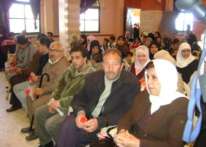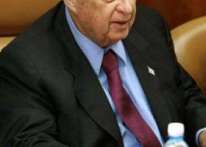Abbas-ordered censorship campaign threatens Palestinian press
Bethlehem – Ma’an – The Palestinian Authority (PA) has carried out an unprecedented campaign of censorship and intimidation against West Bank and Gaza Strip journalists in recent months, according to a Ma’an investigation.
Long considered among the freest in the Arab world, Palestine’s few independent news agencies are being targeted by Palestinian President Mahmoud Abbas’s security establishment, particularly the PA’s Office of the Attorney General, which is currently headed by Ahmad Al-Mughanni.
In mid-November, Al-Mughanni’s office temporarily shut down a leading Palestinian news agency in the Gaza Strip, Donia Al-Watan, for its story on political corruption in the PA. Because the website operates out of Gaza City, which is controlled by Hamas, the PA Attorney General’s Office is only able to censor content accessible from the West Bank, which it did.
Donia Al-Watan is an independent electronic newspaper that was established six years ago and achieved success in Palestine and throughout the Arab world. Rather than taking funds from political factions, Al-Watan is funded solely through advertisements on its site. Its chief editor, Abdulla Issa, identifies himself as a former member of Fatah.
For several days in November, the site was blocked to West Bank Palestinians who arrived at the URL (http://www.alwatanvoice.com) to find a message, reading, “We are sorry, the site was blocked based on attorney General instructions (sic).”
And although Attorney General Al-Mughanni announced in 2006 that his office was pursuing over 50 cases of political corruption, he and Abbas are apparently not interested in Al-Watan’s help pursuing corrupt officials.
“The Palestinian president blocked our site by decree,” according to Al-Watan Editor in Chief Abdulla Issa.
“Shortly after we revealed a number of corruption cases in the PA,” Issa told Ma’an in a telephone interview, the agency’s website “was blocked by a decree issued by Palestinian President Mahmoud Abbas.
“Palestinian Attorney General Ahmad Al-Mughanni blocked the website from readers in the Palestinian territories,” Issa added.
The censorship order reportedly came immediately following an embarrassing expose on Abbas’s cabinet, titled, “Ramallah’s Banana Republic,” and accompanied by a photograph of an exhausted Abbas leaning on a table. The article focused on an argument between Rafeeq Al-Husieni, the head of the PA’s Office of the President, and other PA officials.
Within a matter of days, Donia Al-Watan was offline to Palestinian readers. It remained inaccessible for over two weeks.
“The attorney general did not call us and we were not given the chance to defend ourselves,” Issa explained, adding that “the president’s decree was carried out without taking any legal procedures.”
“Even in their imaginary courts, the accused is given a chance to defend himself and maybe given the chance to have an attorney,” Issa later wrote.
Left to their own devices, Al-Watan’s Ramallah correspondents started digging, eventually finding that the blockade was due to a complaint filed by President Abbas’s own office. It took them about a week to uncover the censorship order.
“The blockade was aimed at pressuring us to stop publishing articles on corruption, which we were forced to do, following further threats at taking us to court, accusing us of ‘defaming the Authority,’ again without notifying us,” Issa said. “We were asked to stop publishing stories related to the Palestinian Authority.”
For its part, the PA claims it is not against freedom of speech, “but its blockade of a website is evidence that they fear the opinions of writers and poets, that they have a double standard when it comes to free speech,” Issa continued.
Human rights groups fear reprisal
Naturally, Al-Watan turned to the Palestinian Journalists’ Syndicate, the largest union of Palestinian journalists. After explaining the situation, the heads of both the Gaza City and Ramallah offices were outraged, with one telling Issa, “This cannot happen. We will issue a statement denouncing this act,” at least according to him.
Shortly thereafter, the Journalists Syndicate issued two statements. The first was to extend condolences on the occasion of the death of the uncle of one of its members in Gaza. The second statement congratulated the father of another Gaza City office worker recovering from surgery.
“No statement was released denouncing the actions taken against us,” Issa lamented, noting that when it comes to such blatant violations of media rights, even the most sympathetic are too afraid to speak out against the PA.
“And Palestinian human rights organizations abroad too ignored the issue because the PA was part of the problem,” he added, shedding light on an apparent refusal of Palestinian human rights groups to criticize anything but Israel.
According to Issa, the PA thinks it can promote itself to the world as a democratic institution that respects human rights and freedom of speech, “but this is a lie that has no basis in reality. The PA can do whatever it wants and with full media cover.”
The PA “is fighting any independent nonpartisan media outlets. The case is it’s either you are affiliated (with them) and enjoy the protection and funds, in one way or another, or you are engaged in an increasingly dangerous and escalating media war,” Issa said.
Assaulting and detaining Palestinian journalists
While Al-Watan is the only Palestinian news site known to have been arbitrarily shut down by the Palestinian Authority, freedom of the press in the West Bank and Gaza Strip has been eroding for years.
According to a November report by Reporters Without Borders (RSF), Palestine’s ranking in journalistic freedom has fallen every year since Abbas took office, although beginning in 2004, when it stood at 127 out of 167 countries worldwide. Today, Palestine is ranked 163 out of 167.
In mid-October, PA security forces detained journalist Alaa Jaber Al-Titi from a refugee camp north of Hebron on the charge that he was “inflaming turbulence and reinforcing fragmentation,” as well as “working for an illegal satellite channel (Al-Aqsa TV) that has been banned.”
Later that month, the International Federation of Journalists (IFJ) demanded that the PA release At-Titi and other imprisoned journalists, saying that they amounted to “political prisoners.” IFJ Secretaty-General Eden White said that “journalists are being used as pawns” in the ongoing Fatah-Hamas conflict, going on to say that their arrests are scare tactics, “a means of intimidation and an excuse to control the media.”
In late November, the PA arrested reporter Nae’l Nakhlah of the Al-Quds newspaper, leading to a furious response from the Palestinian Journalists’ Union, which demanded his immediate release and the cessation of media arrests. Later in November, the same union accused the PA of nine other similar arrests and slammed Abbas’s administration for attempting to “silence media and oppose their freedom,” according to a statement.
On 2 December, PA security forces disguised as civilians detained two Ma’an journalists in the northern West Bank city of Tulkarem. They were later released when Ma’an took up the issue with area security services.
And earlier this month, the Palestinian Journalists Syndicate revealed that some of its journalists have been in PA prisons for “more than three months.”
Increasingly hostile practices against Palesitnian journalists aside, the PA until November had not gone as far as actually blocking access to a website, a tactic used by Arab countries throughout the Middle East but generally avoided in Palestine.
However, despite that Donia Al-Watan’s corruption story ran on several Arab websites and news agencies, the PA chose to retaliate exclusively against the Gaza-based agency, likely due to its history of challenging corruption in the Palestinian government—long before Abbas had even taken office.
’Arafat supported us’
“(Late Palestinian President Yasser) Arafat supported us,” Issa explained, highlighting just how much the atmosphere for free press has changed since the former president passed away in 2005.
“We are surprised that these procedures are being issued by the Palestinian president, who must have forgotten that he was amongst the biggest critics of Arafat’s policies (before being elected Palestinian president),” Issa noted.
“But [Arafat] didn’t shut down any press organizations. In fact, he was known as a friend to journalists,” Issa insisted, suggesting that his agency’s success today is due in part to the timing of its establishment.
“Al-Watan was founded in 2003; we wouldn’t have been able to become this successful without Arafat’s democracy,” Issa claimed.
During Arafat’s reign, Al-Watan published dozens of corruption stories. The late president believed that “independent journalism can stop corruptors, in light of his own inability to bring them to account,” Issa said. And Arafat avoided threatening, or even warning, journalists who opposed him.
“The harshest thing he ever told us was when he was under siege in the presidential compound in Ramallah. He sent someone to tell us that ‘it’s time to stop attacking X and Y.’ We respected his view, but we still published the articles, along with the full names of well-known figures and ministers,” Issa said.
“Our message to Arafat,” Issa maintained, “was that if the PA is unable to bring the corrupt to account, journalism should play its role.”
“And Arafat supported us,” Issa insists, making the distinction between the two Palestinian presidents’ administrative policies on a free Palestinian press. “The corrupt knew it; they knew we were chasing them and Arafat supported us.”
But according to Issa, the real difference between Arafat and the current Palestinian president is that “Abbas doesn’t want to fight corruption or bring the corrupt into account.”
“His procedures are against journalism and free speech,” Issa said. “It’s a shame that while readers from all over the world can still read Al-Watan’s stories, Palestinians cannot.”
“We’re one of two independent media outlets in Palestine other than Ma’an News Network; other than them there are only partisan media outlets,” he said.
Issa added that as an organization, Donia Al-Watan has two options: tolerate the increased pressure, day after day, or move the website to a European country, “where there is freedom and real democracy—not just the slogans of the Palestinian Authority.”
---
On the Net:
Donia Al-Watan site (Arabic): http://www.alwatanvoice.com
***This report was compiled by Ma’an News Agency’s English Desk, with additional reporting and translation from Manar Jibrin.
































التعليقات